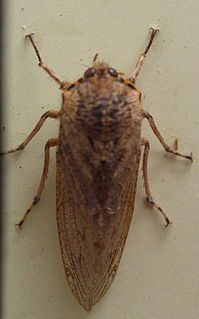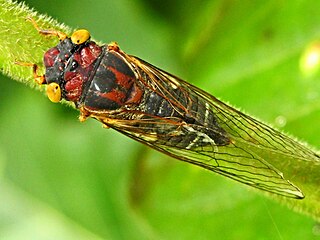| Graptopsaltria | |
|---|---|
 | |
| Graptopsaltria tienta, female | |
| Scientific classification | |
| Kingdom: | |
| Phylum: | |
| Class: | |
| Order: | |
| Suborder: | |
| Infraorder: | |
| Superfamily: | |
| Family: | |
| Subfamily: | |
| Tribe: | |
| Genus: | Graptopsaltria Stål, 1866 |
| Species | |
See text. | |
| Graptopsaltria | |
|---|---|
 | |
| Graptopsaltria tienta, female | |
| Scientific classification | |
| Kingdom: | |
| Phylum: | |
| Class: | |
| Order: | |
| Suborder: | |
| Infraorder: | |
| Superfamily: | |
| Family: | |
| Subfamily: | |
| Tribe: | |
| Genus: | Graptopsaltria Stål, 1866 |
| Species | |
See text. | |

The cicadas are a superfamily, the Cicadoidea, of insects in the order Hemiptera. They are in the suborder Auchenorrhyncha, along with smaller jumping bugs such as leafhoppers and froghoppers. The superfamily is divided into two families, the Tettigarctidae, with two species in Australia, and the Cicadidae, with more than 3,000 species described from around the world; many species remain undescribed.

Magicicada is the genus of the 13-year and 17-year periodical cicadas of eastern North America, consisting of seven species. Although they are sometimes called "locusts", this is a misnomer, as cicadas belong to the taxonomic order Hemiptera, suborder Auchenorrhyncha, while locusts are grasshoppers belonging to the order Orthoptera. Magicicada belongs to the cicada tribe Lamotialnini, a group of genera with representatives in Australia, Africa, and Asia, as well as the Americas.

Ichirō Fujiyama, born Takeo Masunaga, was a popular Japanese singer and composer, known for his contribution to Japanese popular music called ryūkōka by his Western classical music skills. He was born in Chūō, Tokyo, and graduated from the Tokyo Music School. Although he was regarded as a tenor singer in Japanese popular music, he was originally a classical baritone singer. He also acted in various films, and was a close friend of Minoru Matsuya (1910–1995). His workroom has been reproduced inside the "NHK museum of broadcasting" as an exhibit.

The Auchenorrhyncha suborder of the Hemiptera contains most of the familiar members of what was called the "Homoptera" – groups such as cicadas, leafhoppers, treehoppers, planthoppers, and spittlebugs. The aphids and scale insects are the other well-known "Homoptera", and they are in the suborder Sternorrhyncha.

The Tettigarctidae, known as the hairy cicadas, are a small relict family of primitive cicadas. Along with more than 20 extinct genera, Tettigarctidae contains a single extant genus, Tettigarcta, with two extant species, one from southern Australia and one from the island of Tasmania. Fossil taxa include Paratettigarcta from the Miocene of New Zealand, Meuniera from the Paleocene of France, and Sanmai from the Late Jurassic of China, and Maculaferrum of early Late Cretaceous Canada.Tettigarcta are the closest living relatives of the true cicadas.

Fujiyama (富士山) was a Japanese steam frigate acquired by the Tokugawa shogunate during the Bakumatsu period immediately prior to the Meiji Restoration. She was built in New York City, United States, in 1864.

The Tibiceninae are a subfamily of cicadas, containing the covered-tymbal cicadas. In some treatments this group is merged whole or in part with the Cicadinae.

Predator satiation is an anti-predator adaptation in which prey briefly occur at high population densities, reducing the probability of an individual organism being eaten. When predators are flooded with potential prey, they can consume only a certain amount, so by occurring at high densities prey benefit from a safety in numbers effect. This strategy has evolved in a diverse range of prey, including notably many species of plants, insects, and fish. Predator satiation can be considered a type of refuge from predators.

Clinofibrate (INN) is a fibrate and a derivative of Bisphenol Z.

Graptopsaltria nigrofuscata, the large brown cicada, is a species of cicada in the genus Graptopsaltria of the family Cicadidae found across East Asia, including Japan, the Korean Peninsula, and China. They are called aburazemi (アブラゼミ) in Japanese. The males make a loud chirping that ends with a click caused by a flick of the wings.

Aleeta curvicosta is a species of cicada, one of Australia's most familiar insects. Native to the continent's eastern coastline, it was described in 1834 by Ernst Friedrich Germar. The floury baker is the only described species in the genus Aleeta.

The Fidicinini are a tribe of cicadas. There are at least 20 genera and 250 described species in Fidicinini, found in the Nearctic and Palearctic.

The Polyneurini are a tribe of cicadas found in the Palearctic and Indomalaya.

Henicopsaltria eydouxii, commonly known as the razor grinder, is a large species of cicada native to eastern Australia. Predominantly brown in colour, it is found in dry and wet sclerophyll forest in December and January and is quite common in Brisbane.

Cicada 3301 is a nickname given to an enigmatic organization that, on three occasions, has posted a set of puzzles to recruit codebreakers from the public. The first internet puzzle started on January 4, 2012, on 4chan and ran for nearly a month. A second round began one year later on January 4, 2013, and then a third round following the confirmation of a fresh clue posted on Twitter on January 4, 2014. The third puzzle has yet to be solved. The stated intent was to recruit "intelligent individuals" by presenting a series of puzzles which were to be solved. No new puzzles were published on January 4, 2015. However, a new clue was posted on Twitter on January 5, 2016. In April 2017, a verified PGP-signed message was found. It explicitly denies the validity of any unsigned puzzle. A verified puzzle was never posted again.
Aphaenogaster avita is an extinct species of ant in the subfamily Myrmicinae known from a solitary early to middle Miocene fossil found in Japan. At the time of description A. praerelicta was one of twelve Aphaenogaster species to have been described from fossils and the only fossil species from Japan.

Cicada is a genus of old world cicadas in the family Cicadidae, and the tribe Cicadini. There are at least 60 described species in Cicada.

Lamotialnini is a tribe of cicadas in the family Cicadidae. There are about 19 genera and at least 90 described species in Lamotialnini, occurring worldwide except South America.

Cosmopsaltriini is a tribe of cicadas in the family Cicadidae. There are about 8 genera and at least 90 described species in Cosmopsaltriini, found in southeast Asia, Australasia, and Oceania.

Cicada barbara is a species of cicada belonging to the family Cicadidae, subfamily Cicadinae and the genus Cicada.